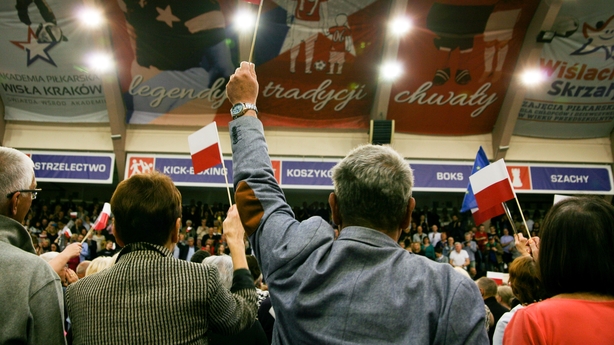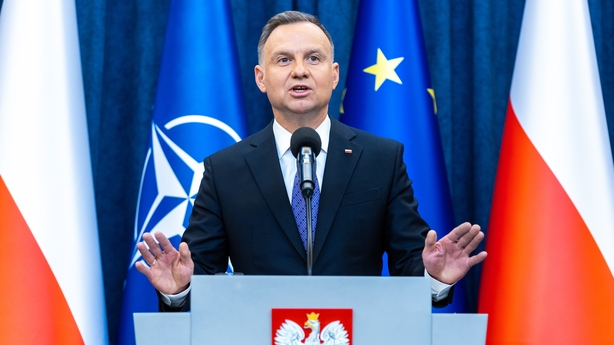Thousands of Poles are expected to take to the streets of the capital Warsaw today to protest against a new law, signed by Poland's President Andrzej Duda earlier this week, which will create a new commission to investigate whether individuals succumbed to "Russian influence" between 2007 and 2022.
Donald Tusk, leader of the main opposition Civic Platform party, will lead the protest following a week of heightened tension between his party and the ruling right-wing Law and Justice party.
Smaller marches by opposition supporters will take place in other Polish cities, as well as in London, Brussels, Rome and Chicago.
The law, proposed by Law and Justice just a few months ahead of October’s parliamentary election, has surprised many.
"The proposal came in a speedy way," Wojciech Przybylski, a political analyst, told RTÉ News.
"I think it's a politically calculated strategy because the overall objective of the political forces in power, is not to let go of power. They are doing these things perfectly knowing what is at stake," said Mr Przybylski, editor-in-chief of Visegrad Insight.
Civic Platform, a centrist party, along with other centre and left-wing parties argue that the creation of the new commission poses a threat to Polish democracy.
Earlier this week, Wprost, a weekly news magazine, reported that Prime Minister Mateusz Morawiecki asked: "Why is our esteemed opposition, in particular Donald Tusk, so scared to death of the commission verifying Russian influence?"
The new law does not define what "Russian influence" is exactly, which, critics say, could leave it open to interpretation by the ruling government.
Individuals found guilty by the new body – to be comprised entirely of MPs and senators – could be barred from holding public office for up to 10 years.
Members of the commission will be selected by the Sejm, Poland’s lower house of parliament, where Law and Justice holds a majority, and the chairperson is to be nominated by the Prime Minister.
Officially entitled 'The Commission for the Study of Russian Influences, 2007-22’, the law has become known colloquially in opposition circles as the ‘Tusk Law’, as many Civic Platform supporters believe that Donald Tusk, a former prime minister from 2007 to 2014, is the true target of the new decree.

Mr Tusk, also a former president of the European Council, will lead his party into a tightly-contested parliamentary election in October, against the Law and Justice, which has won the last two elections and governed Poland since 2015.
Prior to Russia’s illegal annexation of Crimea in 2014, Warsaw’s economic relations with Moscow remained relatively normal, as was the case in many EU countries.
But that also means that the seven years leading up to 2014 - an era when Poland relied on cheap Russian gas imports, and when Donald Tusk and his ministers often held bilateral meetings with Kremlin officials – could come under scrutiny by the newly created commission.
The panel could look at events from the perspective of 2023, more than a year after Russia’s invasion of Ukraine, Jakub Jaraczewski, a legal analyst, told RTÉ News.
He said, this would make it "very easy to point out any sort of interaction or energy deal as negative."
"Simply put, it's up to the panel to decide with very, very vague guidelines, what is Russian interference or Russian influence, and what is not. The danger here is, of course, that these kinds of imprecise laws will be abused," said Mr Jaraczewski, of Democracy Reporting International, a Berlin-based think tank.
The commission will not probe incidents of "Russian influence" prior to 2007, when a previous Law and Justice administration was in power.

Mr Duda, formerly a Law and Justice MP and MEP before winning the presidency in 2015, and again in 2020, said that he signed the bill so that "the public could form an opinion on how decisions were made by people in power".
On Friday, Mr Duda back-peddled slightly, proposing a new draft which would amend the law, allowing those accused of coming under "Russian influence" to lodge an appeal to Poland’s court of appeals.
The bill that Mr Duda signed into law earlier this week provided no grounds for appeal.
The president's conciliatory position comes days after concerns were raised by both the European Commission and the US Department of State over the law.
He told Bloomberg in an interview on Wednesday that he did not understand the reaction of Poland’s allies, and that the new commission would not bar opposition politicians from standing for office.
The first report from the panel is due to be published on 17 September, a symbolic date for Poles. On that date in 1939, the Soviet Union invaded Poland, joining up with its then-ally Nazi Germany to carve up the country.
"It plays on our own Polish fears that we are under surveillance, and we are micro-managed by Russia. Duda's speech on Monday all plays into the hearts and minds of Poles on both sides. But it was not enough of a smokescreen," said Mr Przybylski.
Mid-September is also just one month prior to Poland’s parliamentary election, and Civic Platform fears it could be used to target its politicians during the final weeks of campaigning.
The date of today’s protest - 4 June - also holds particular significance for many Poles. On that day in 1990, Poland held its first post-war free elections, leading to the collapse of the country’s former Communist rulers.
Mr Tusk's party, polling at 28%, has been clear to draw parallels between that historic vote and, what its leadership perceives as, the threat posed to Polish democracy by the "Russian influence" law.
Poland’s centrist and left-wing opposition parties look unlikely to form one united voting block ahead of October’s election.
Szymon Holownia, the leader of Poland 2050, another centrist party and Civic Platform’s smaller rival, has remained cautious about signing up to a pre-election pact with Mr Tusk’s party.
However, Mr Holownia said earlier this week that he will participate in today’s protest in Warsaw. The leader of PSL, a small but influential farmer's party, will also join the march.
Law and Justice remains Poland's most popular party, polling at about 32%.
"I think that of all the developments that have happened since 2015, this is perhaps the most significant because, so far, when it comes to elections, Law and Justice has been playing mostly by the rules," said Mr Jaraczewski.
"Here we have, for the first time, a direct attempt to influence the election process and to influence the vote."







